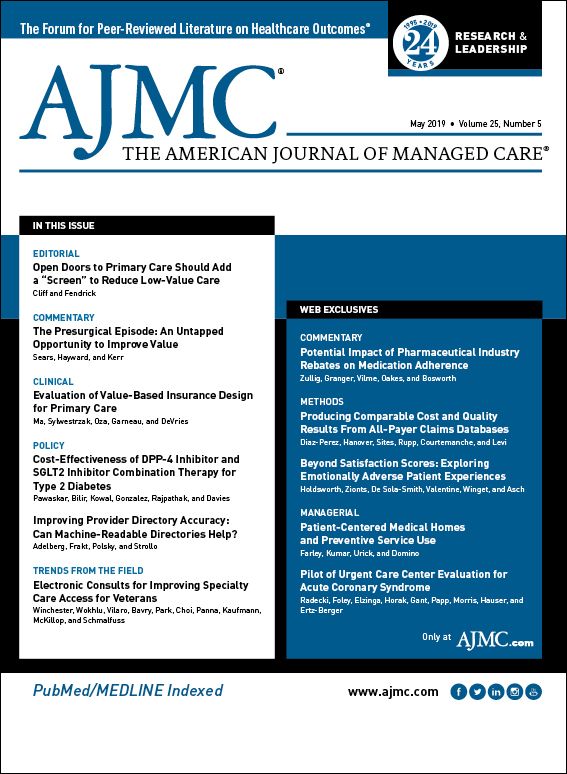- Center on Health Equity & Access
- Clinical
- Health Care Cost
- Health Care Delivery
- Insurance
- Policy
- Technology
- Value-Based Care
From the Editorial Board: Daniel B. Wolfson, MHSA
People generally recognize the importance of trust and how trust in the current environment is eroding. In fact, the healthcare system is the “biggest loser,” suffering the largest decline in trust among all institutions covered by Gallup polls.1 In 2015, only 37% of the public reported that they had a “great deal” or “quite a lot” of confidence in the medical system compared with 80% in 1975.
Trust is the heart and soul of medicine because it is the core of medical professionalism. Jo Shapiro, MD, from Brigham and Women’s Hospital in Boston, would state this equation in her lectures: Professionalism = Trusting and Respectful Relationships.
This simple but powerful notion of professionalism provided clarity for the ABIM Foundation’s work in the mid-2000s and for me as a student of professionalism, whose organization joined with others to produce the 21st century definition of medical professionalism, A Physician Charter. What is medical care but a series of relationships and interactions, mostly between people? Organizations are defined and driven by the many interactions among the people working within them. The quality of those interactions can develop or hinder trust and build professionalism or tear it down.
During the ABIM Foundation’s 2018 Forum on rebuilding trust, 150 diverse stakeholders came together to explore how to build trust within 11 dyad relationships in healthcare: patient and organization, clinician and organization, clinician and health plan, patient and physician, physician and physician, health systems and underserved communities, healthcare organizations and community organizations, teachers and learners, patient and physician in the era of artificial intelligence, clinicians and government, and the public and healthcare news reporting. Forum participants envisioned a healthcare system that created trusting and respectful relationships in these 11 relationships, with professionalism as the dominant change agent—all in service of improving quality and affordability.
Imagine this exercise put into practice more broadly, with multiple stakeholders able to sit down together, appreciate different perspectives, and arrive at conclusions for the betterment of the patient, the community, and the entire healthcare system. This would involve a shared vision and understanding of the design of a person-centered delivery system, information sharing, payment reform, measurement, and cost transparency. Discussion of value-based interventions explored in this issue of The American Journal of Managed Care® would be guided by strengthening the trust of patients and consumers, answering the proverbial question: Value for whom?
At the end of the day, how will patients and families benefit when we make changes in payment to recognize value, focus on health outcomes and not just revenue, reduce prices (particularly pharmaceutical prices), create cost transparency, and reduce unnecessary care and financial harm? Does the patient gain trust or experience mistrust in the healthcare system, and will they feel that all clinicians are working as professionals in the best interest of their patients and the public?REFERENCE
1. Lynch TJ, Wolfson DB, Baron RJ. A trust initiative in health care: why and why now? Acad Med. 2019;94(4):463-465. doi: 10.1097/ACM.0000000000002599.

Quality of Life: The Pending Outcome in Idiopathic Pulmonary Fibrosis
February 6th 2026Because evidence gaps in idiopathic pulmonary fibrosis research hinder demonstration of antifibrotic therapies’ impact on patient quality of life (QOL), integrating validated health-related QOL measures into trials is urgently needed.
Read More
Building Trust: Public Priorities for Health Care AI Labeling
January 27th 2026A Michigan-based deliberative study found strong public support for patient-informed artificial intelligence (AI) labeling in health care, emphasizing transparency, privacy, equity, and safety to build trust.
Read More
Ambient AI Tool Adoption in US Hospitals and Associated Factors
January 27th 2026Nearly two-thirds of hospitals using Epic have adopted ambient artificial intelligence (AI), with higher uptake among larger, not-for-profit hospitals and those with higher workload and stronger financial performance.
Read More
Motivating and Enabling Factors Supporting Targeted Improvements to Hospital-SNF Transitions
January 26th 2026Skilled nursing facilities (SNFs) with a high volume of referred patients with Alzheimer disease and related dementias may work harder to manage care transitions with less availability of resources that enable high-quality handoffs.
Read More

